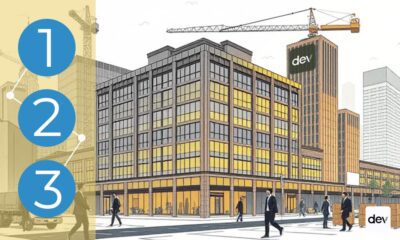
Property Management
What is a Triple Net Lease? NNN Meaning, Benefits & Risks
Read our detailed overview of Triple Net Leases (NNN) now, explaining their meaning, outlining the benefits, and highlighting the risks. This resource is essential for anyone looking to understand the complexities and implications of NNN leases in the commercial real estate sector.
What is a Triple Net Lease?
A triple net lease (NNN) is a lease on commercial real estate (CRE) investment property where the tenants cover most or all property expenses. Investors seek NNN properties for their real estate portfolios since these investments can provide a semi-passive to passive income. However, these properties are not without risk, and investors must do their due diligence when evaluating this investment strategy.
If you are interested in learning the makeup of a NNN lease, this guide will discuss the pros and cons of NNN investment properties, how to evaluate deals, and secure financing. We’ll also show you where deals can be found, who benefits from a NNN, how to calculate the triple net rent, and delve into the tenant/landlord’ responsibilities.
How Do NNNs Work?
Tenants pay all or most of the operating expenses in a triple net lease plus rent, maintenance, and repairs. Landlords want to secure “investment grade” tenants in long-term leases to mitigate default risks and vacancies.
Investment-grade tenants or leases are with corporations with a BBB- or higher rating. The BBB- is a solid credit rating given by Moody’s, Fitch, or Standard & Poor (S&P). You may know investment-grade tenants like Walgreens, McDonald’s, and Dollar General. however, these tenants can also be hyper-local banks, restaurants, bars, and salons.


Types of Net Leases
As an investor or tenant, you may encounter different net leases. These include absolute net (Abs NNN), triple net (NNN), double net (NN), and single net or net lease (N). Each has different levels of responsibilities and expenses. There is also an extreme example of an NNN called a land or ground lease.
Here are the types and how they work:
- Abs NNN: In this type of net lease, the tenant pays all the property’s expenses directly. It is the most passive net lease investment.
- NNN: In an NNN, the tenant still pays for taxes, maintenance, insurance, structural changes, and repairs but may not pay them directly. Sometimes, landlords pay these expenses and get reimbursed by the tenant.
- NN and NN R&S: In a double net lease, the tenant pays taxes and insurance, and the landlord pays for maintaining the common area roof and structure (R&S) and parking areas or lots.
- N: Single net leases are when the landlord pays for maintenance and repairs, common areas, taxes, and insurance, and tenants pay other expenses like utilities.
- Absolute NNN ground lease: The tenant leases the land and is responsible for the complete new construction project and its building, maintenance, and operating expenses. The tenant only owns the building, not the land it is on, and pays the triple net rent to the landlord for using the land. These leases can include the 99-year lease (or longer).
What is the difference between CAM and NNN?
Common Area Maintenance (CAM), are the costs associated with maintaining common areas within a commercial property or building. These are typically found in Abs NNN as well as NNN leases, and are the tenants responsibility. The tenant pays for CAM in one of two ways; costs are billed directly to the tenant, or costs are paid by the landlord, then reimbursed by the tenant.


Landlord vs Tenant Responsibilities
Although NNNs are thought to be mostly passive for the landlord, each party has duties and responsibilities as defined in the lease agreement. Let’s explore the financial obligations and responsibilities not only for the tenants, but also the landlords.
Landlord Responsibilities
As we discussed, the type of net lease and the lease agreement define what landlords are responsible for. Even in an Abs NNN, landlords will have expenses; after all, most real estate investments are never genuinely passive. Here are some costs and responsibilities landlords may encounter depending on the type of net lease they choose:
- Common area maintenance (CAM)
- HVAC systems, roof, structure, and foundation
- Parking lot repair and maintenance
- Real estate investing business expenses, such as legal and accounting, marketing, and tenant screening
- Commercial loan principal and interest payments
Tenant Responsibilities
In a NNN, most of the responsibility falls on the tenant to pay expenses, modify, and maintain the property. The tenant is also responsible for their business operating expenses and franchise fees, if applicable. Two categories define these–property operating costs and business expenses. Please see below:
- Property costs include rent, utilities, taxes, maintenance, janitorial and repairs, capital improvements, and property insurance.
- Business costs include legal fees, inventory, taxes, wages, office supplies, business insurance, filing fees, and accounting.
In an Abs NNN, the tenant may save money by choosing their vendors for maintenance, repairs, renovations, insurance, and utilities. If the tenant reimburses the landlord, it’s wise to get the best deal on these costs and negotiate with the landlord on suppliers. It is always crucial to perform thorough due diligence to avoid overpaying.


Frequently Asked Questions (FAQs)
Can you depreciate a triple net lease?
Yes, landlords can depreciate a NNN property. However, only buildings are depreciable. The land it sits on does not depreciate. The straight-line depreciation on a commercial NNN property is 39 years. The tenant cannot depreciate the property but has depreciable property operating expenses such as rent, utilities, and repairs.
What is a $25 NNN?
A $25 triple net lease is when the landlord charges a base rent of $25 per square foot in addition to the rest of the property’s operating expenses. For example, a landlord charges $25/sf (per sq foot) on a 4,800 sf building. The total annual rent is $120,000 ($4,800 * $25), which means the monthly rent is $10,000 ($120,000 / 12 months). The tenant would then pay the monthly rent, in addition to other expenses. It’s a good option when the market rent is at or above $25 per square foot. You may also encounter other dollar amount NNNs where the rent is advertised per sq. ft.
Why would someone agree to a NNN?
A tenant would agree to a triple net lease because the rent for these properties can typically be lower than non NNN leases, especially in newer properties that don’t need extensive repairs. Investors like NNNs because of the opportunity for long-term quality tenants and a steady stream of passive income with minimal hands-on requirements.
Bottom Line
A NNN is an investment property that offers passive to near-passive income for the investor, and a long-term lease for the tenant. Both parties benefit but also face inherent risks. Landlords can keep expenses lower because they don’t carry the property operating costs, but they risk challenges in finding new tenants if vacancies arise. Tenants have more control over how they remodel the space but carry higher costs with property expenses. Overall, a triple net lease can be an incredible asset for investment portfolios.






